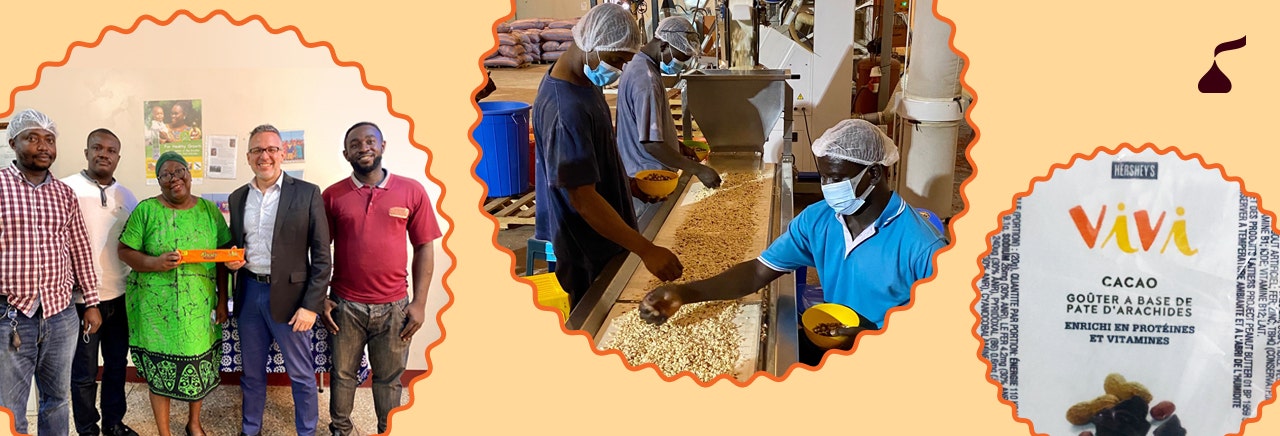Making a Difference Through the Energize Learning Project: An Interview with AIM-Progress Africa Hub
The African Union (AU) has declared 2022 to be the Year of Nutrition. With high levels of malnutrition in Africa, the AU is committed to strengthening resilience in nutrition and food security on the African continent and to strengthening agri-food systems.
AIM-Progress Africa hub, along with regional facilitator Partner Africa, is enabling member companies in the region to come together, exchange best practices, launch projects and ensure positive impact at a wider scale. Africa hub co-chairs, Goodwill Shandu, The Coca-Cola Company, and Phangisa Matsebula, AB InBev, are leading the support of these activities. With this agenda in mind, the AIM-Progress newsletter highlighted a project from The Hershey Company that focuses on improving children’s access to nutrition, while simultaneously contributing to the fight against child labour and strengthening agri-food systems.
Q: Can you explain what the project entails?
A: Energize Learning is a project funded entirely by The Hershey Company, which is partnering with Project Peanut Butter, an NGO focused on children’s nutrition, to produce and distribute daily via schools in Côte d’Ivoire and Ghana a vitamin-fortified, peanut butter-based snack called “ViVi” that provides children with 30 percent of their daily recommended vitamin intake.
Q: Can you explain how this project increases nutrition rates while simultaneously contributing to the fight against child labour?
A: Since 2015, when the project first started, we have seen children respond very enthusiastically to ViVi. Research has shown that children who receive ViVi have significantly lower rates of childhood anaemia. Because of ViVi’s popularity, children are motivated to attend school and to remain at school throughout the day instead of staying at home after the lunch break. Better educated children mean children who are more likely to achieve their full potential, breaking free of the cycle of poverty and illiteracy that is among the identified root causes of child labour. The more hours that children spend in school mean fewer hours during which they may be tempted to perform hazardous tasks on their families’ farms.
Q: Can you explain how the project relates to strengthening agri-food systems?
A: The Hershey Company is proud of the support that it provides to local producers of peanuts, currently offering them a secure market for about 100 tons of peanuts annually. The project is supporting local capacity to deal with a range of food safety issues, including aflatoxin and food packaging and handling. We also source locally grown and locally processed cocoa (as a flavouring) and several other materials and ingredients for ViVi that have been produced in-country, adding to the economic impact of the project at the community level. We are optimistic that this impact will grow as the project evolves and expands in Côte d’Ivoire.
Q: What have been the cornerstone of the project’s achievements?
A: The Hershey Company and Project Peanut Butter have engaged in strong partnerships with the Ghana School Feeding Programme and the National Nutrition Council in Côte d’Ivoire. These partnerships, which extend down to the level of school principals in the targeted communities, are allowing us now to provide ViVi free of charge to more than 45,000 school children daily. The construction of state-of-the-art ViVi production facilities in both countries also is a very significant element of the Energize Learning project’s success.
Q: What tips would you like to give to other companies or African based suppliers?
A: The importance of understanding and aligning with priorities established by national governments cannot be overestimated and is essential for obtaining requisite local support.
Do you want to learn more about this project? Please reach out to Tim McCoy, Director, Cocoa Partnerships, Hershey Trading GmbH.
This interview was originally published in the AIM-Progress newsletter. AIM-Progress is a global initiative of leading Fast Moving Consumer Goods (FMCG) manufacturers and suppliers joining forces to drive positive change in their supply chains and promote responsible sourcing practices and sustainable production systems. AIM-Progress works in a pre-competitive environment with more than 45 members from diverse set of brands and suppliers linked through the commonality of their supply chains. Its mission is to positively impact people’s lives and ensure respect for human rights, while delivering value to members and their supply chains. This is done across four areas: the human rights priorities and respective working groups, the regional hubs (Africa and APAC), mutual recognition work stream to create synergies in approaches, and the capability building work stream to equip the members with knowledge and ability to execute strong responsible sourcing programmes. Follow AIM-Progress on LinkedIn for more information.
![]()
